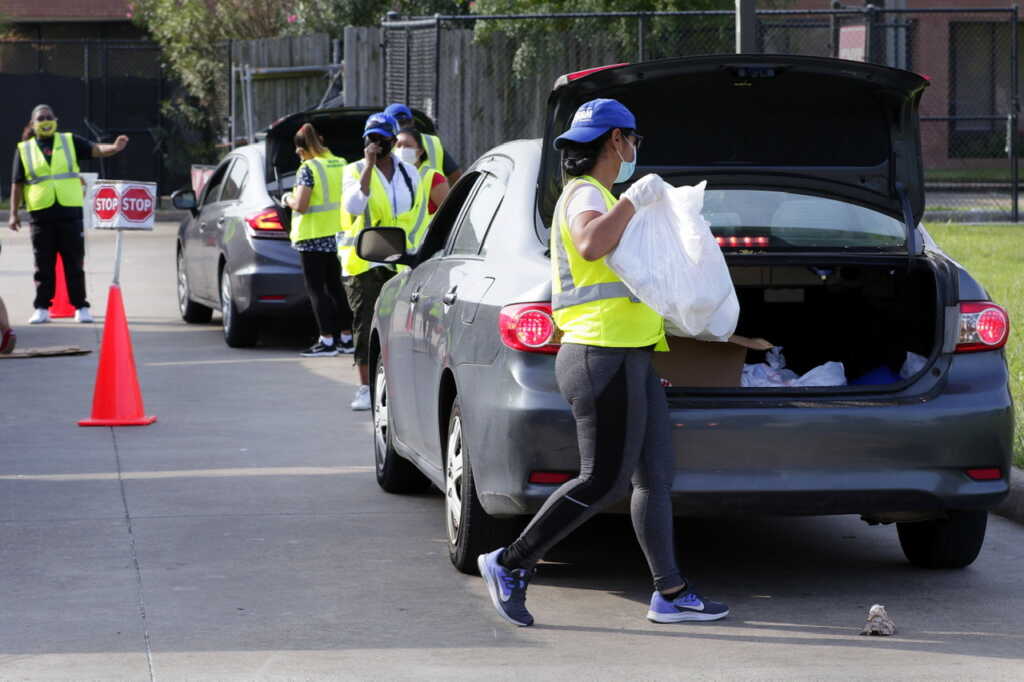Ahead of Thanksgiving this year, food banks across the country were handing out meals to thousands of unemployed and underemployed Americans struggling to make ends meet. And as the pandemic and its restrictions continue, new data is predicting one-in-six Americans could experience food insecurity by year’s end.
“Prior to the pandemic, things were rough,” Convoy of Hope President Hal Donaldson told Faithwire during a recent Zoom call. “And the pandemic has only made things more difficult.”
This year alone, Convoy of Hope — a faith-based humanitarian organization — has distributed more than 150 million meals to those in need around the country.
Donaldson, who himself grew up in poverty, said his organization has partnered with 3,000 churches so far that have turned their parking lots into makeshift “distribution centers” to give out meals to hungry Americans unable to feed themselves or their families.
The efforts of Convoy of Hope couldn’t come at a more necessary time.
According to information compiled by Feeding America, the largest hunger-relief organization in the country, more than 54 million people could go hungry this year — a 45% increase from 2019, according to the U.S. Department of Agriculture. And anecdotal data from retailers, police departments, and loss prevention researchers is showing an uptick in the number of Americans shoplifting food as the aid available to them is, in many areas, failing to meet the needs caused by the pandemic and ongoing lockdown measures, The Washington Post reported this week.
Donaldson — whose deep-seated passion to help those in need arose out of an unexpected conversation he had years ago with Mother Theresa, who asked him, “What are you doing for the poor and the suffering?” — said his charity’s model of partnering with local churches around the U.S. is the most effective way to combat the hunger crisis.
“There’s a tendency in America to think that the government can solve every problem,” he said. “It cannot. It absolutely cannot. And politicians want you to believe that they can. They cannot. It’s impossible. The only way we are going to turn this around is if people like you and me look on it as more than a government responsibility or a national problem.”
“Hunger is a personal problem; it’s you and me just doing our part every day,” Donaldson continued, referencing Mother Theresa, who famously said, “If you can’t feed a hundred people, at least feed one.”
For Christians, the call to do “our part every day” should only grow clearer as the needs of those around us increase exponentially.
Asked what role faith plays in his work with Convoy of Hope, Donaldson said he is convinced the local church “is really the vehicle through which … Jesus wants to heal our nation and the world.”
Convoy of Hope makes it a point of partnering with churches around the country because those congregations “are gonna be there long after we have left,” Donaldson explained, adding, “Anything we can do to elevate the local church and lift up the name of Jesus, we want to do.”
He also predicted that, in a post-pandemic world, local churches will have realized the “tremendous responsibility they have not only to lead people to Jesus but also to fill their empty stomachs.”
“The church is the most powerful force in the United States,” Donaldson said. “It’s more powerful than the White House and the Capitol — the church — because it’s grassroots. It’s in every community across our nation.”
“If you were to ask me, ‘What do you see in the future?” he added. “I see a united act of compassion: the church working together as never before to meet both physical and spiritual needs and to bring healing to our nation.”
To learn more about the work of Convoy of Hope, click here.



